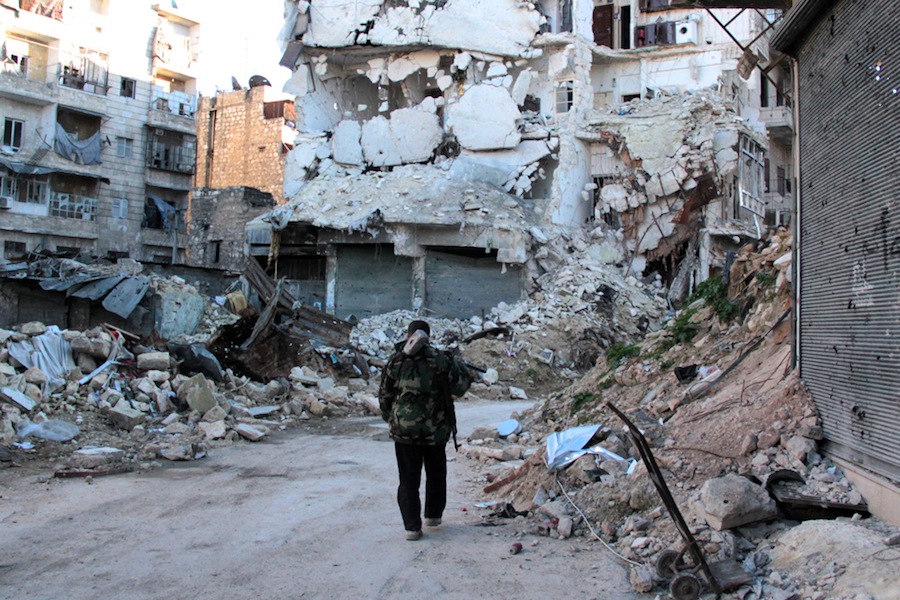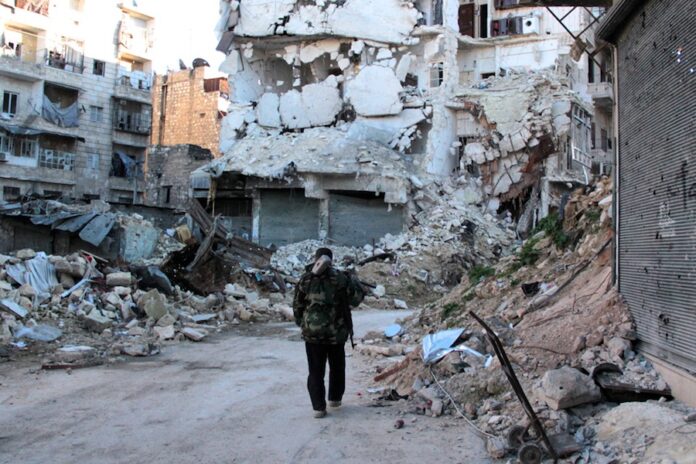
 How the Arab Spring contributed to Syria’s downfall
How the Arab Spring contributed to Syria’s downfall
A boy lies face down on the sand, as the waves of a beach in Turkey wash over him. A police officer looks the other way, hollering at people we cannot see. The water moves back and forth, back and forth, but the boy lies still on the sand like a big doll that’s been abandoned by children who’ve grown bigger than their toys. At three, he hasn’t lived a life long enough to understand why he and his family had to leave home, or why they needed to cross perilous waters in shoddy lifeboats to reach a foreign land. All he can do is follow his parents, and all his parents can do is run from whichever danger faces them next. Bullets, bombings, ISIS, the Kurds — at this point, it doesn’t even matter.
But he’s not running anymore. The iconic image of Aylan Kurdi sparked international outrage and gave a face to the Syrian Civil War. Aylan Kurdi’s story helped humanize a crisis the UN characterized as the biggest humanitarian emergency of our era. The picture of his lifeless body on the beach, pasted on every newspaper around the world, brought the globe to a full stop, just for a second, as it focused its attention on the mass exodus of refugees from Syria.
It’s been five years since the Syrian Civil War began, and entire cities steeped with ancient heritage and historic sites have been laid to waste. About half the population has fled the country, and at least 386,000 people have been killed. The city of Aleppo, one of world’s oldest, lies in ruins. Still a civil war in name, the conflict has escalated into a proxy war for different countries, namely the United States and Russia. Every powerful nation in the world today plays a role on the Syrian battlefield, and diplomatic relations between countries have soured as a result. Turkey is in conflict with the EU, and the EU is in danger of breaking up due to numerous issues including the refugee problem. In this context, it seems impossible to believe that the story starts out with a fruit seller in Tunisia.
After being publicly humiliated, a fruit seller marched in front of a government building in Tunisia and self-immolated. Catalyzed by his act of desperation, protests broke out all over the city, standing up against the dictatorial regime and asking for a real democracy. Within a month, the President had fled the country.
The success of the non-violent protests in Tunisia sparked a series of demonstrations in many other Middle Eastern countries, leading to a movement now known as the Arab Spring. While these originated independently in each country, their demands were very similar. The common people were fed up with their oppressive and corrupt regimes, and wanted a government where they had a real say in the decisions made. Poor economies in these countries created mass unemployment that led to educated youth taking up jobs not suited to their capabilities. This led to widespread dissatisfaction among the large population of youth in the Middle East, and was a large factor in the popularity of the anti-government protests.
The Arab Spring had mixed outcomes in the various countries that it affected. Despite setbacks, Tunisia has been working hard to establish a strong foundation of democracy. Egypt seemed to be moving towards a state of progression, but has since relapsed into a system resembling the previous one — except it’s the military in power this time. On the other hand, the Arab Spring set off civil wars in Libya, Iraq and Yemen.
But nowhere have the consequences of civil war been as horrific as Syria.
Hafez al-Assad came to power in Syria in 1970, and set up the first organized government. As President of Syria for 30 years, he established much of the framework of modern Syria, but dealt with anti-establishment demonstrations with an iron fist. The current president of Syria, his son Bashar al-Assad, has carried on many of the same traditions as his father.
It’s perhaps this tradition of extreme repression that ultimately caused Syria’s downfall. When protests broke out in Syria in 2011 during the Arab Spring, Assad went against the established trend of dictators stepping down, and instead called in the Syrian Army to aggressively crush the rebels. After decades of being suppressed, the anger against Assad’s regime began to take on a very ugly form. The peaceful protests quickly escalated after the government’s violent crackdown. Armed opposition rebels began to fight back — at first to defend themselves, then to expel security forces from the neighborhood. As time went on, these rebel groups turned on each other.
The regional powers in the Middle East were drawn in when religion entered the fray. Mr. Assad belongs to the Alawite sect of Shia Muslims, a minority in Syria, while the majority in Syria are Sunni Muslims. This is part of the reason why the Assads have taken a tough stance regarding anti-government propaganda — they constantly fear being overthrown or ousted by the Sunni majority.
An added dimension to the crisis is supplied by the Islamic State, or Daesh, as they are called in Syria. The armed rebellion against the government has lost many of the secular moderates that started it and is now comprised of Islamists and jihadists belonging to ISIS. The radical Islamic group split from other rebels fighting Assad, and started preying on Kurds and other minorities in the region. Taking advantage of the chaos of war, they declared their own state and the creation of a “caliphate” in 2014. Their rise has been mysterious, to say the least.
As the Islamic State starts carrying out attacks overseas in Western countries, many international powers like France have been drawn into the war to defeat ISIS. Iran and Russia, along with Hezbollah (a Shia Muslim militant group) are fighting to uphold Assad’s regime. There is an interesting power tussle at play here between longtime enemies Russia and the U.S.
“The Russians know that if the current regime falls, the new state is going to be something like Egypt, a client state of the United States,” said Noha Radwan, a professor of Arabic at UC Davis. “So they are interested in supporting Bashar al-Assad.”
Syria had been on Russia’s side in the Cold War, and Russia wants to keep it that way. The U.S. sees an opportunity here to influence Syrian politics and bring Syria to their side. Russia and the U.S.’s opposing interests, then, only add to the conflict, with the former trying to display its military strength by supplying weapons to pro-Assad groups.
Many people living in Syria are not prominently part of any of the fighting groups, and wish to stay out of it. They may identify as Muslim, but most do not support the Muslim Brotherhood or ISIS ideology. They want a democracy and don’t really want Assad to continue with his reign. They have nothing to do with international powers who have entered the fray, and do not care for the foreign countries that aren’t concerned with them.
Caught between the proverbial rock and a hard place, many Syrians have been forced to relocate to safer places. Over 6.5 million people have been displaced in Syria itself, and more than 4.5 million people have packed their bags and fled. To make matters worse, Syria previously took in many refugees from the Israeli-Palestinian conflict, who have now been forced to relocate yet again. With their homes reduced to rubble behind them, the population of Syria has spilled over the borders to Lebanon, Jordan, Turkey and Iraq. Turkey currently houses the highest population of refugees in the world. Iraq faces its own ongoing civil war, while trying to cope with a rising number of internally displaced peoples there.
At first, when the Syrian Civil War started, most believed that it would be over in perhaps a few months, and sought refuge closer to home from where they could move back as quickly as possible. When that didn’t work, they moved into neighboring countries where they had families. As the war escalated, people started looking for more permanent housing with security and jobs. In most cases, immigrants in Jordan and Lebanon are not allowed to work, and this significantly disrupts their lives.
Soon, the line of refugees started to pass through Turkey, and knocked on Europe’s doors. European reaction have varied between hopeful and frightened. German Chancellor Angela Merkel has welcomed Syrian refugees with open arms and has promised to try her best to manage the crisis, but now faces opposition from her own party for her decisions. Sweden has also demonstrated a high standard of responsibility in dealing with the crisis, accepting the highest number of refugees per capita in the EU.
But this issue has severely polarized countries like the United Kingdom and France, where the refugee crisis has become a major part of political discourse. The U.K. has been sending a significant amount of aid to regions neighboring Syria in hopes that migrants will choose to stay nearer to their homes and not undertake the perilous journey across the sea. Moreover, it has become increasingly clear, especially after Brexit, that migrants aren’t fully welcome in the U.K. Many people from the older generations resent the growing number of non-native people who they believe are taking away jobs rightfully belonging to U.K. citizens.
Terrorist attacks in France have forced the country to wage war against ISIS in Syria, and President Hollande has promised to accept 30,000 refugees in the next two years. But judging from the favored predictions of the looming French elections, citizens there aren’t happy with his decisions. Instead, they have shifted their support to the far-right Marine Le Pen, who strongly opposes opening France’s borders to Syrian immigrants.
Immigration also proved to be a major issue during our 2016 Presidential election. Showcasing Orlando and San Bernardino as examples, Trump promised to halt Muslim and Syrian entry to the U.S. and create a Muslim registry. Looking at the results of that election, we can clearly say that he had support from the American people in his policies. Not long after becoming President, Trump issued a controversial immigration ban — in effect a Muslim ban — that barred citizens of seven Muslim-majority countries from entering the United States. After immense opposition, he signed a revised version of the order, but Syrian refugees remain prohibited from entering the U.S.
Countries which have chosen to bar or limit refugee entry have faced significant backlash online and in person alike. Governments around the world have been accused of having no compassion, no humanitarian feelings and have been labeled as xenophobic or racist. While this may be partly true, we must consider the fact that fears about terrorism, so prominent in Europe now, are grounded in reality. It’s easy to sit behind a computer and call out a government on their actions, but decisions like these are far more complicated than they seem and need to be thought through from many angles before they can be carried out. As a government elected by the people, it is their duty to make sure that their own citizens are taken care of first — economically and socially — before we extend our services to those of other nations. As citizens of a country, we have every right to be outraged at our government’s treatment of refugees — but we forget that there are others who elected them and the government is responsible to them too.
So why are countries so reluctant to let in refugees?
The first and most important reason is resources. Many European nations and the U.S. are still recovering from the crippling 2008 financial crisis and have been unable to employ the large numbers of people who lost their jobs and are struggling to find another. Syria’s neighboring countries, already poor and unable to provide for their own citizens, are struggling to provide refugees with the space, food and security that they need. Many refugees go on to Greece after Turkey and stop there before continuing to Europe. Greece’s economy, already one of the worst in the E.U. right now, is suffering from the population spike caused by refugees.
Simply providing accommodation to refugees is not enough. We must make sure they receive their basic rights as human beings. Each person should have access to food, shelter and basic medical care. About half of the refugee population consists of children, and they are missing out on education with every day that they spend in a refugee camp. This creates a vicious cycle, in which they never receive education, are unable to get a job and are never able to rise out of the poverty they suddenly found themselves in after the war.
The second reason — more specific to the Middle East — is the terrorist threat. If there’s one major reason why other countries are worried about Syria’s situation, it’s the rise of anti-West and Islamist and jihadist groups that threaten the security of every other nation. From Brussels to Paris to Dhaka, ISIS has slaughtered innocent civilians indiscriminately. Many believe that refugees entering Europe may secretly belong to, or hold the violent beliefs that ISIS propagates. This has led to a general distrust of all Muslims — possibly the worst reaction to the jihadist threat. ISIS has consistently tried to portray the West (and the rest of the world) as being anti-Muslim, and if we start to hate Muslims, their beliefs are validated. Hate breeds hate. When we don’t make Muslims feel welcome, they may start to feel that Islamist groups like ISIS were right all along. It’s worth remembering that the reason Syrians are fleeing their country in the first place is because of groups like ISIS — they fear them as much as we do.
Speaking in 2015 on the threat of terrorism, former President Obama said the Islamic State, “seeks to exploit the idea that there’s war between Islam and the West.” He said that, “when you start seeing individuals in position of responsibility suggesting Christians are more worthy of protection than Muslims are in a war-torn land, that feeds the [Islamic State] narrative.”
It may be years before peace returns to Syria. It will most certainly be decades before any scars heal and reconstruction can take place. Complex issues like this will never have a clear solution that satisfies everybody, but what we as global citizens can concentrate on is the plight of normal people in Syria, especially the numerous children who have nowhere to go. Our response to them in their moment of crisis decides how the next generation of Syrians turn out — as well-rounded human beings who give back to society, or to the religious fundamentalists that we work so hard to quell.
The United States is a nation built on immigrants. Most people living here have a history of immigration in their family. Refugees come here for the opportunity to work hard and create the life that they want for themselves. We, more than any other country, know firsthand how important immigrants are to the economy and well-being of a nation. It’s time we stepped up to do our part for such a vulnerable part of the global population.
Written by: Shohini Maitra — samaitra@ucdavis.edu
Disclaimer: The views and opinions expressed by individual columnists belong to the columnists alone and do not necessarily indicate the views and opinions held by The California Aggie.





